 Petzlover
Petzlover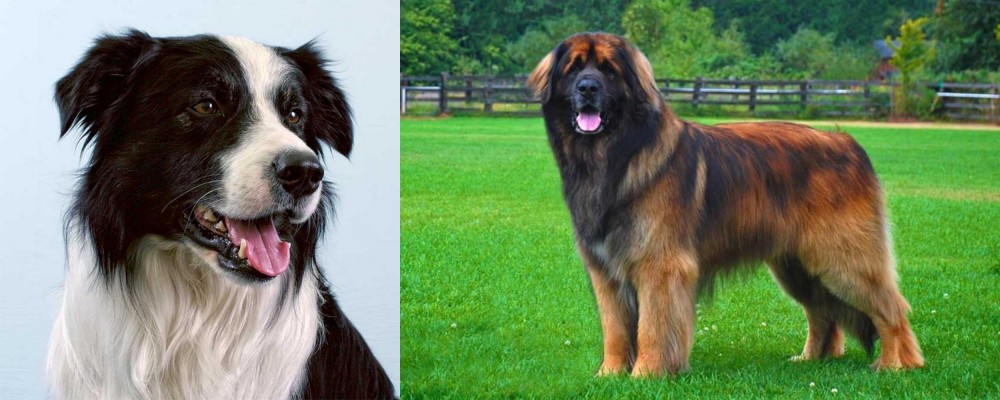 Border Collie is originated from United Kingdom but Leonberger is originated from Germany. Border Collie may grow 24 cm / 9 inches shorter than Leonberger. Border Collie may weigh 57 kg / 125 pounds lesser than Leonberger. Border Collie may live 7 years more than Leonberger. Border Collie may have less litter size than Leonberger. Both Border Collie and Leonberger requires Moderate Maintenance.
Border Collie is originated from United Kingdom but Leonberger is originated from Germany. Border Collie may grow 24 cm / 9 inches shorter than Leonberger. Border Collie may weigh 57 kg / 125 pounds lesser than Leonberger. Border Collie may live 7 years more than Leonberger. Border Collie may have less litter size than Leonberger. Both Border Collie and Leonberger requires Moderate Maintenance.
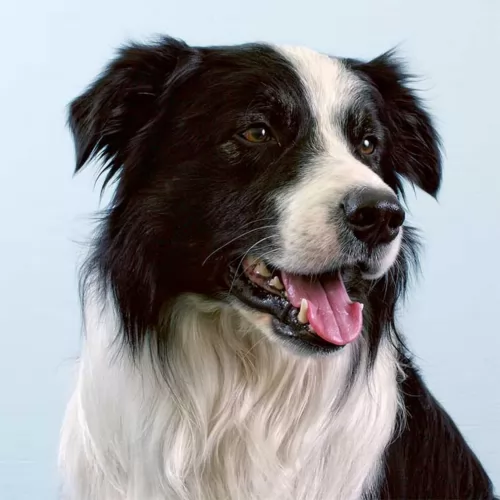 The Border Collie originated in Northumberland and was used to herd livestock. He is particularly well known for his intense stare in controlling the sheep in his care. The name Border Collier wasn’t used until 1915. This was so that the dog could be registered as a separate breed together with other Collie breeds already registered.
The Border Collie originated in Northumberland and was used to herd livestock. He is particularly well known for his intense stare in controlling the sheep in his care. The name Border Collier wasn’t used until 1915. This was so that the dog could be registered as a separate breed together with other Collie breeds already registered.
Sheepdog trials have been held since 1873. The very name of this dog gives you an inkling as to his heritage, as the word ‘Collie’ refers to sheepdogs and comes from Scottish dialect. Today the Border Collie is recognized as the ultimate sheep-herding dog, with his amazing intelligence and herding skills. The Border Collie was recognized by the American Kennel Club in October 1995.
 Hailing from Germany, and more specifically the city of Leonberg, the Leonberger is a giant dog breed.
Hailing from Germany, and more specifically the city of Leonberg, the Leonberger is a giant dog breed.
A resident of Leonberg, Germany, was looking to develop a dog that resembled a lion and in 1846 it was announced that such a dog had been developed by crossing a Newfoundland, Saint Bernard and Pyrenean Mountain dog.
It was after 2010, when the Leonberger Club of America joined the American Kennel Club, that the strict breeding rules were no longer mandatory for all Leonbergers.
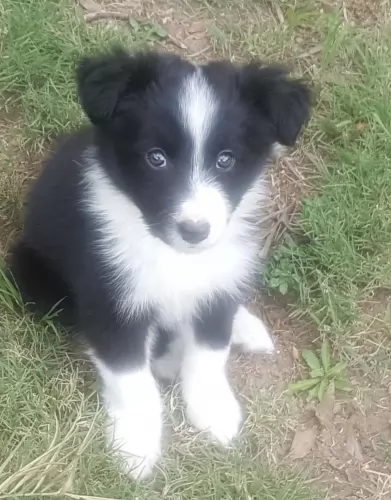 Utterly responsive, intelligent, alert and keen, the medium sized border collie loves nothing more than to be actively working. He requires both mental and physical stimulation. The ideal height for this very intelligent dog is 46 – 53cm and they weigh in at about 14 – 22kg.
Utterly responsive, intelligent, alert and keen, the medium sized border collie loves nothing more than to be actively working. He requires both mental and physical stimulation. The ideal height for this very intelligent dog is 46 – 53cm and they weigh in at about 14 – 22kg.
People who have been to sheepdog trials can only marvel a this dog and his intense stare, moving the sheep to precisely where his master wants them. The dog has a moderately long and smooth coat with a dense topcoat, with soft weather resistant undercoat. Most common color is black and white but other colors such as chocolate and white, liver and white or blue merle are also seen.
There are a few Border Collies which have a single-colour coat. He has a long feathery tail and the ears can be either erect, semi-erect and in some instances, even dropped. He has brown eyes but sometimes with the Merle Border Collie you can get one eye or part of the eye which is blue.
Border Collies are playful, energetic dogs who just love living in homes where the family involves him in all their activities. Because he is so intelligent, he is demanding of his human family, wanting them to take notice of him and provide him with lots of clever games and sports. If he is left without involvement, he can become frustrated and destructive. That is why it is so important to choose your pet carefully.
These highly energetic dogs require owners who recognize this need and are prepared to provide him with lots of games, walks and runs.
 As a giant breed, the Leonberger stands at between 65cm and 80cm in height. He weighs a hefty 40 – 77kg both males and females.
As a giant breed, the Leonberger stands at between 65cm and 80cm in height. He weighs a hefty 40 – 77kg both males and females.
These dogs are described as being dimorphic. It means that there is quite a difference in the looks of the males and females, with the male dogs being heftier and larger than the females.
The head of the dog is large, he has almond-shaped, dark brown eyes and the ears are medium sized and floppy. The tail is long and he has webbed feet which makes him a good swimmer too.
The thick, double coat can be straight or wavy and comes in different colors such as reddish-brown, tan, sandy or yellowish and the hairs can be tipped with black. He sheds quite a bit so will need regular brushing.
The Leonberger can have between 6 – 14 puppies and these puppies are like big, fat, cuddly, fluffy teddy bears. Don’t be tempted to just buy one because of his wonderful looks because they turn out to be huge dogs that eat a lot and the coat can take quite a bit of effort to keep groomed.
Fondly referred to as the Leo, this giant beautiful dog is social and in spite of his size, he should never be left alone in the backyard for long periods of time. He needs to come indoors from time to time to enjoy some interaction with his human family.
He is a family dog, and with training and socialization, he becomes a well-rounded, confident, obedient pet, quiet and content and sensitive to his owner’s moods.
Even though he becomes a great family pet, you need to think twice before you decide to own one of these large dogs as he can be costly to feed.
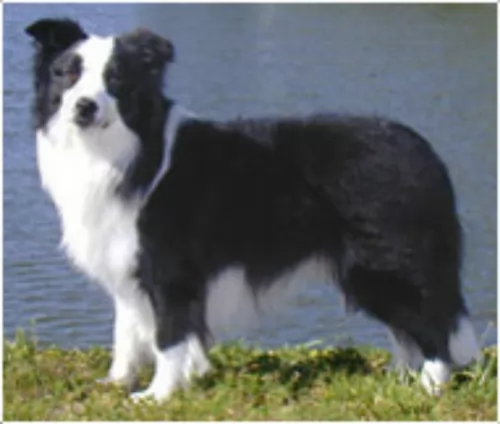 The Border Collie is such an awesome working dog breed, being of tremendous help to farmers. With their endless energy and stamina, given the chance he would want to be working all day. This medium sized dog will need a family where they are hard working and active just like him. He makes a wonderful pet with the right owners and if everyone is active in the family, he becomes your devoted soulmate.
The Border Collie is such an awesome working dog breed, being of tremendous help to farmers. With their endless energy and stamina, given the chance he would want to be working all day. This medium sized dog will need a family where they are hard working and active just like him. He makes a wonderful pet with the right owners and if everyone is active in the family, he becomes your devoted soulmate.
He is sensitive to what his owner wants and that is also because he is highly intelligent. Shower your wonderful pet with lots of love, give him lots of attention and plenty of activities, and you’ll have an awesome friend for life.
 Don’t be deceived by the looks of the big Leonberger because he isn’t aggressive, but quiet and calm. Large he may be, but he isn’t sluggish either and he will certainly require exercise such as a long, fairly lively walk every day.
Don’t be deceived by the looks of the big Leonberger because he isn’t aggressive, but quiet and calm. Large he may be, but he isn’t sluggish either and he will certainly require exercise such as a long, fairly lively walk every day.
They’re intelligent dogs too and respond well to socialization and training. He is a social dog and wants to enjoy plenty of interaction with his human family members.
These dogs are often used as rescue- and therapy dogs as they are so loving and sensitive. Give him lots of love and good care and you’re going to have the most wonderful pet that lives up to the saying – dogs are man’s best friend.
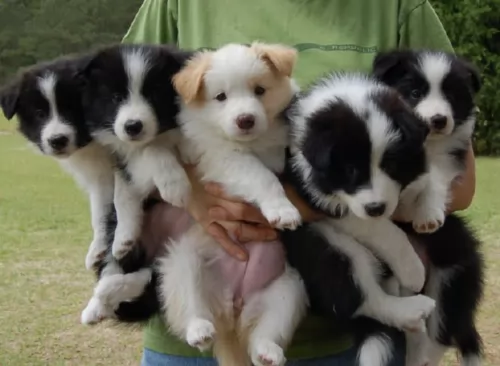 If your Border Collie is healthy, he can live to be 14 years of age and longer. There are one or two dog ailments that are more common in this breed, so it is wise to be aware of what can go wrong, although with good care it is highly unlikely.
If your Border Collie is healthy, he can live to be 14 years of age and longer. There are one or two dog ailments that are more common in this breed, so it is wise to be aware of what can go wrong, although with good care it is highly unlikely.
Primary epilepsy, known as idiopathic epilepsy can be seen in your dog before the age of 5 years, and although a genetic link in border collies has not yet been identified, idiopathic epilepsy is more prevalent in some breeds. Seizures in your dog are caused by electrical disturbances in the brain and treatment may be for life. While epilepsy in dogs can’t be cured, the condition can be managed with medication recommended by your vet and then he can lead a healthy life.
Collies are prone to developing hip dysplasia, which is an inherited condition with abnormal formation of the hip socket. For your pet it can mean lameness as well as painful arthritis. You’ll see your collie dog battling to rise after lying down. It is actually common in lots of dog breeds, but more so in larger breeds.
This is an inherited problem that can lead to your dog going blind. About 70 to 97% of collies in the UK and the United States are affected. Your veterinarian will examine your dog to determine the extent of the defect. It is common in the first year of a dog and can be be prevented if caught early.
 Leonbergers are strong, generally healthy dogs. It is said that very large dogs like this don’t live as long as smaller dogs and they also face more health issues. Orthopedic issues such as hip dysplasia are more common with large breeds.
Leonbergers are strong, generally healthy dogs. It is said that very large dogs like this don’t live as long as smaller dogs and they also face more health issues. Orthopedic issues such as hip dysplasia are more common with large breeds.
An orthopedic problem like this is a misalignment of a joint. This large dog also tends to develop elbow dysplasia too. Fortunately today, hip- and elbow dysplasia is controlled because of efforts of breeders to have their Leonbergers screened.
Nonetheless it is important to know about this ailment. The word ‘Dysplasia’ is referring to an abnormality of development. With both hip- and elbow dysplasia, there is abnormal development of the joints, and osteoarthritis can build up, causing lameness for your giant canine.
Cancer is sadly a leading cause of death in dogs over the age of 10 years. Lymphoma is a blood-related cancer – a tumor of the lymph nodes. Dogs can develop different forms of lymphoma. The warning signs are a lump or a wound that won’t heal, swelling in the bone and abnormal bleeding.
Luckily cancer is very treatable in dogs, but you need to get your dog to the vet as soon as possible.
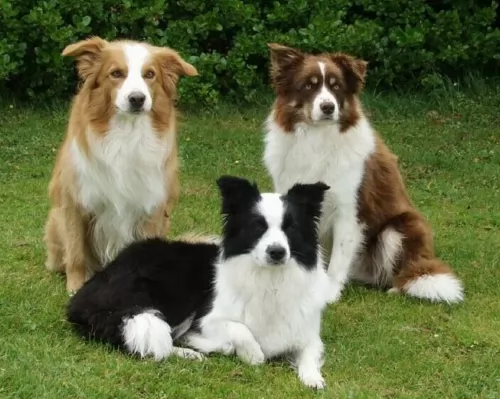 This is a dog that will need plenty of exercise and attention. He won’t do well cooped up in a tiny home. He’ll want lots of place to run and play and with his owners involved in his activities. It is unfair of any dog owner to buy a dog like this and then leave him so that he becomes distressed from being ignored.
This is a dog that will need plenty of exercise and attention. He won’t do well cooped up in a tiny home. He’ll want lots of place to run and play and with his owners involved in his activities. It is unfair of any dog owner to buy a dog like this and then leave him so that he becomes distressed from being ignored.
Do your dog a favor and see that he is socialized as a puppy and trained as he grows older. Once he has been trained, he becomes a super pet, obedient, sensitive and willing to please.
Border collies shed throughout the year, and with Summer his shedding becomes a bit more. He will require a good brushing at least twice a week to get rid of loose hairs and to ensure that the long hair doesn’t become tangled. He isn’t considered hypoallergenic and is regarded as a safe pet to have for people with allergies.
This high energy working dog will require top quality food from the top brands if you intend feeding him from commercially produced dog food. He will certainly need raw meat added to this food from time to time to ensure you stave off skin problems such as rashes. You can also add in rice, meat and vegetables for variety to ensure his is getting in all the minerals and vitamins he needs. Fresh, cool water should always be available to him day and night.
 That long coat of the Leonberger is going to require some brushing at least twice a week. He is also a moderate shedder and you want to get rid of all that loose hair and to keep him looking well groomed.
That long coat of the Leonberger is going to require some brushing at least twice a week. He is also a moderate shedder and you want to get rid of all that loose hair and to keep him looking well groomed.
A proper, nutritious diet is an essential part of having healthy, happy dogs and if you’re unsure about how to feed your giant pet, speak to your veterinarian.
The best diet for dogs is always very debatable, but essentially it needs to be kept simple. Try and invest in the very best commercially manufactured dog food for large breeds. Every dog wants a tasty home-made morsel from time to time. Add in cooked chicken, brown rice as well as cooked or raw vegetables. Raw meat can also be added in from time to time.
You want to avoid feeding the Leonberger puppy a high protein diet as this encourages rapid growth and you want to avoid that.